FC Barcelona: 5 Reasons Barca Will Win the Champions League
Yoosof Farah@@YoosofFarahFC Barcelona: 5 Reasons Barca Will Win the Champions League
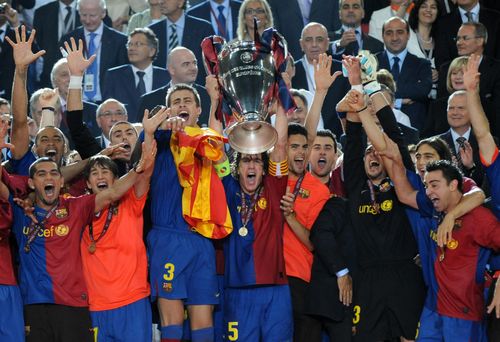
FC Barcelona were back to their brilliant best last night, as they destroyed Shakhtar Donetsk 5-1 in the first leg of their UEFA Champions League quarterfinal at the Camp Nou.
At one point, however, it could've been all different as Yaroslav Rakitskiy netted to pull a goal back for the Ukrainians to make it 3-1.
But instead of the momentum swinging with Shakhtar, Barca got angry and scored yet again, as they skillfully crafted their way to another five-star showing.
The current La Liga champions again look odds-on to secure another Tripla Corona this year, with the Copa Del Rey final against Real Madrid coming up soon, along with the inevitable El Clásico Champions League semifinal.
Having already beaten Los Galácticos 5-0 this season, Barca are the undeniable favourites to reach Wembley and win the most prestigious prize in club football, the UEFA Champions League.
And why shouldn't they be? The Barca juggernaut has so far annihilated all opposition attempting to block its path to glory, just ask Madrid. Or Shakhtar. Or Arsenal. Or any other team they've played this season (apart from the mighty Hercules, of course).
Here are five reasons why FC Barcelona will win the 2011 UEFA Champions League at the home of football, Wembley Stadium.
Tiki-taka
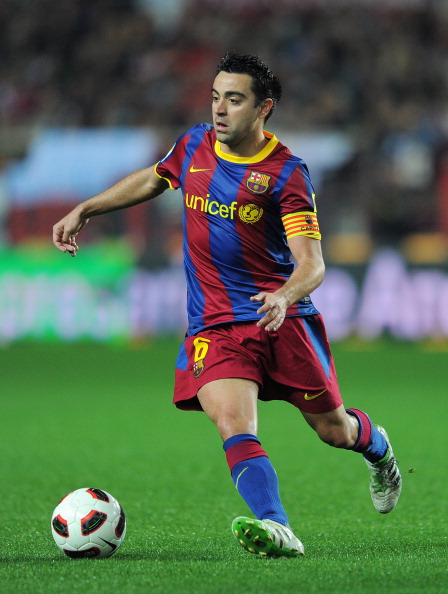
As almost every opponent that has come up against Barca have proved, playing against tiki-taka is very, very tough, because of course, it's always impossible to play football when you don't have the ball.
And just like that ball hog at school who'd never pass, even though you were always in a great position, FC Barcelona don't want to let go of the ball, ever.
Their style of play is epitomised by crisp, constant, accurate passes, designed first of all to let everyone have a touch of the ball and to feel comfortable in the game, before becoming a cruel tactic to make the other team run and run and run in a desperate attempt to win back the ball.
And when the opposition get tired and/or have a momentary lapse in concentration, one of Barca's forever moving and inter-linking attacking options will move into the empty space and score with the efficiency of a heartless mercenary.
It's a footballing method which is so hard to play against, because it requires absolute defensive discipline and concentration for 90-plus minutes, combined with the cardiovascular fitness to constantly keep chasing the ball and putting pressure on Barca, as well as the strong psychological state to not get frustrated, lash out and potentially receive a deleterious red card.
And it also requires players to have the technical ability to beat Barca's World Cup-winning defenders and goalkeeper when the odd chance to score does come about.
Real Madrid, who Barca will most likely meet in the semis, failed to cope with it and lost 5-0. Manchester United, who could well play Barca in the final if they beat Chelsea (quite likely) and then beat Schalke 04 (again, quite likely), lost out in the 2009 final to Barca after failing to cope with their play.
Lionel Messi
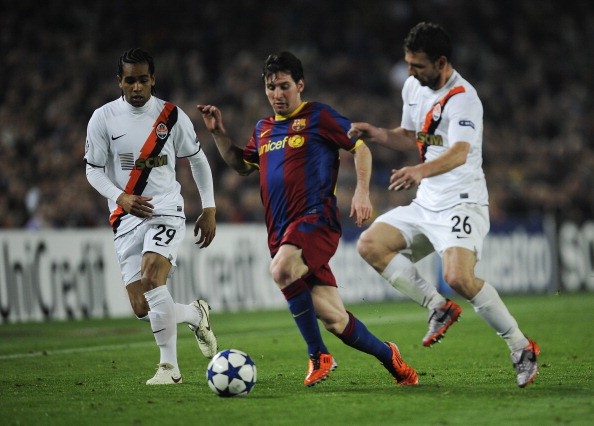
There are many great things about having the world's best player in your team. He scores you all the goals you need, he strikes fear into opponents to make your other lads play better and he keeps the chairman and board of directors off your back because he becomes a great marketing tool for the club.
Lionel Messi is the biggest on-pitch asset FC Barcelona have, with his 45 goals from just 44 matches and his 22 assists helping the Catalan colossus go eight points clear of second-placed Real Madrid at the top of the table (a big psychological advantage ahead of their inevitable semifinal) and helping them reach the Copa Del Rey final and Champions League quarterfinal.
It's no wonder he's currently the official best footballer in the world.
And it's such a status Lionel Messi has, which means his team immediately has an advantage in every match he plays before a ball is even kicked.
Opponents see the team sheet, see Messi's name on it, and undoubtedly think, "Oh s**t!" As was proved against Arsenal, Shakhtar and in La Liga against Real Madrid, defenders, goalkeepers, midfielders, the whole lot, they're all scared of what Leo Messi can do with a football.
Which leads nicely to the point that to combat Messi's powers, team's have him double (or sometimes even triple) marked. Of course, if these are top quality defenders, then great, Messi can be stopped. But that means one defender is marking Messi instead of picking up another Barca player who's in space.
And with a Barca team where seven or eight players are involved in every attack, and a team in which any player has the ability to score (as proved against Shakhtar), that unmarked Barca player, courtesy of Messi, could well be the one to net home that winning goal.
Togetherness
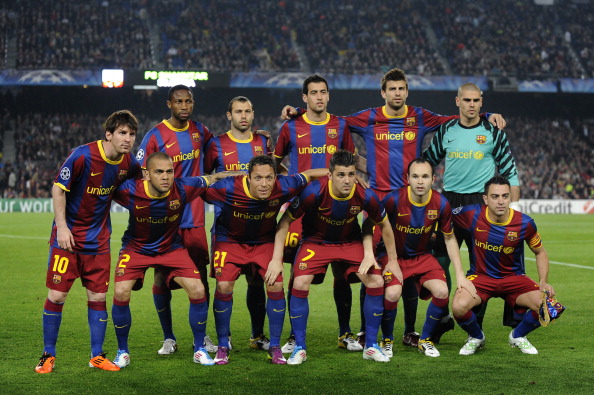
One of the key reasons why FC Barcelona have won so much, and yet Manchester City (who equally have uber-talented players) have won diddly-squat, is because of their togetherness.
City have yet to fully "gel" as a squad, whereas Barca did all their gelling many moons ago.
Of FC Barcelona's key first-team players, 10 of them came through La Masia, with only Dani Alves, David Villa and players in the left-back position (Abidal, Maxwell, Adriano) being signed from other clubs (well, apart from Gerard Pique who was re-signed from Manchester United).
They've all come through the youth ranks knowing exactly how FC Barcelona play football, and how each other plays football.
These are players who have trained, played with and played against (in practice) each other for several years. They know who likes to move where, who makes the runs in certain positions, who's the best to hold onto the ball, who doesn't mind not receiving the ball for a few minutes, etc.
And of course, having been together for quite a while, all sharing the same language and cultural background and having all shared the same highs and lows of football, these players are all friends more so than work colleagues, and it shows in their confident, energetic, free-flowing football on the pitch in which all players are willing to work hardest to help the team score instead of helping themselves score.
No other team currently left in the Champions League has displayed that togetherness. Chelsea players kept getting frustrated at each other against Manchester United at Stamford Bridge, while the United players didn't seem to trust each other at times. Inter Milan were all over the shop and didn't have faith in their own team's ability after going behind, while the Schalke players all looked at each other as if to say "that was your fault" when they conceded.
Only Real Madrid showed the fluidity of a cohesive unit in their Champions League quarterfinal, but that was against an incredibly low-par Tottenham Hotspur, while such togetherness was lacking at the weekend when they got spanked by Sporting Gijon at the Bernabeu.
Fitness
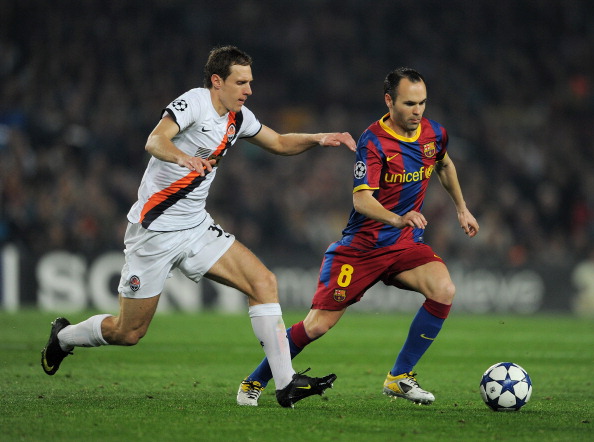
Many Premier League managers have taken trips to Catalunya to observe FC Barcelona training sessions.
And most often it's not all about how they play, the intricate little tactics or the amazing training drills that can turn a team of believers into a team of champions.
Instead, the most valuable thing coaches are said to come away with from watching Barca train is how to get their players' fitness levels up, and keep them up.
Fitness has become the crux of the beautiful game, and as can be seen watching FC Barcelona on TV, the mighty Catalans have it down to a fine art.
The most well-documented player is right-back Dani Alves, who can be the furthest player forward one moment (like when he scored against Shakhtar), and the deepest defending the next.
But it's not just Alves and his fellow full-back which need a great set of lungs. Barca's attacking trio of Lionel Messi, David Villa and Pedro Rodriguez are always moving along the frontline, to confuse and tire out defenders in order to create an opening on goal; they rely mainly on their fitness to keep running until the defender gets tired in order to make space for a shot on goal.
Xavi and Iniesta in the middle see most of the ball, and there are times when they need to keep running just to keep hold of the ball with three or four opponents all on top of them. Doing that 15-20 times a match would be tiring for most footballers, even at the highest level.
And of course Barca need the fitness all over the pitch for when they lose the ball, because Pep Guardiola's tactic in that case is simple: Keep going, running, pressurising the opponents constantly until you win that ball back.
The Name: FC Barcelona
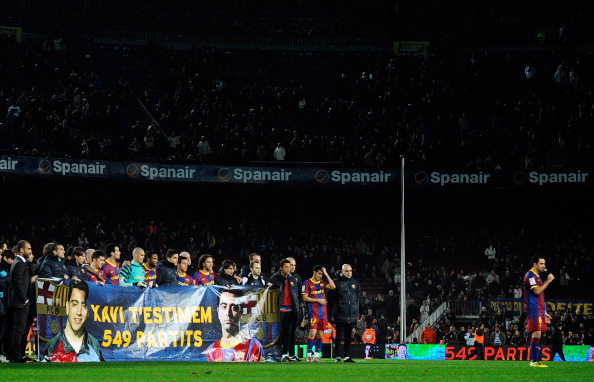
The current FC Barcelona team is renowned as one of the greatest teams there ever was.
The achievements of Pep Guardiola and his men will quite rightly go down in the annals of world football, as the men from Catalunya receive plaudits nearly every second of every day.
In Guardiola, Barca have a man widely considered one of the best managers in the world, especially considering he is the first ever coach in football to win the sextuple, as Barca won six out of a possible six trophies in 2008-09.
Then there's Lionel Messi, who has won the World Player of the Year (now FIFA Ballon d'Or) title two years in a row and who is the current world player of the year, having already scored 173 goals for Barca in 258 games despite still being only 23 years old.
And then we have the other greats. Xavi Hernandez, Andres Iniesta (called the world's best player by Wayne Rooney), Carles Puyol, all players who have two Champions League titles with Barca and several La Liga titles.
Add the young guns to that list like Pedro Rodriguez, Bojan Krkic, Sergio Busquets, who like the aforementioned Spaniards have also won a Champions League title, but unlike Lionel Messi (who is older than them), they also have European Championship and World Cup winners medals.
This is a Barcelona team full of World Cup winners, Champions League champions, La Liga leaders. Some of these names are still quite young, yet already have had an illustrious career under their belts.
And so, playing against a whole team of players of that stature will never be an easy task. It's proved too daunting for the likes of Cristiano Ronaldo and Cesc Fabregas to come up against, whilst the likes of Wayne Rooney, Fernando Torres and Didier Drogba have also faded into obscurity when up against the might of FC Barcelona.
Any team that plays Barca is always up against that when they step onto the pitch, burdened by the fact the players they're playing have more winners medals, better stats and better careers than them.
Why is it so tough to play against Barca? Well, because they are FC Barcelona of course!